Months of Meryl: Defending Your Life (1991)
 Thursday, May 3, 2018 at 3:58PM
Thursday, May 3, 2018 at 3:58PM John and Matthew are watching every single live-action film starring Meryl Streep.
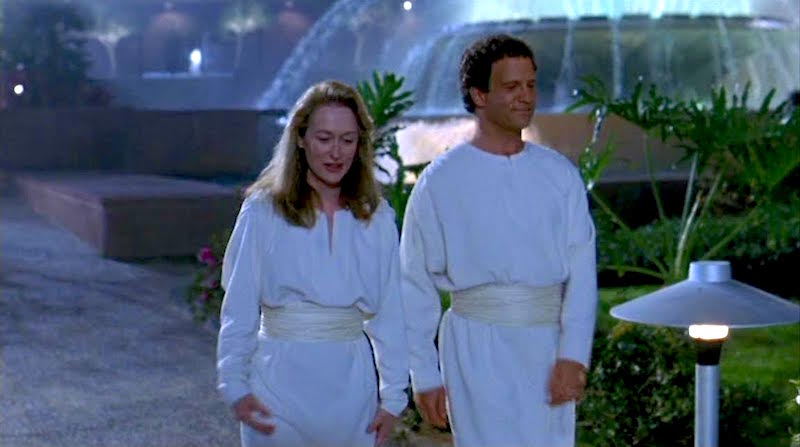
#18 —Julia, a quality human being awaiting her judgment in the afterlife.
JOHN: Defending Your Life, Albert Brooks’ 1991 purgatory comedy, actually contains two movies. One involves Brooks’ Daniel Miller dying in a car accident, arriving in the leisurely Judgment City, and having his entire life reviewed in a trial that will determine whether he is reincarnated as a different person or sent to a higher dimension. The other, shorter film lodged inside Brooks’ painfully vain lark is about the absolute perfection of Meryl Streep. Guess which one is more enjoyable...
About a half hour into the film, after learning about his postmortem predicament and impending trial, Daniel fortuitously runs into Julia, another recent transplant, in a severely unfunny comedy club. The two, both relatively younger than the other white-haired attendees, strike up a conversation and hit it off immediately as Julia laughs at nearly every joke Daniel cracks. Streep’s ethereal presence alone is worth the price of this ticket, and in most scenes, presence is exactly what the film requires of her.
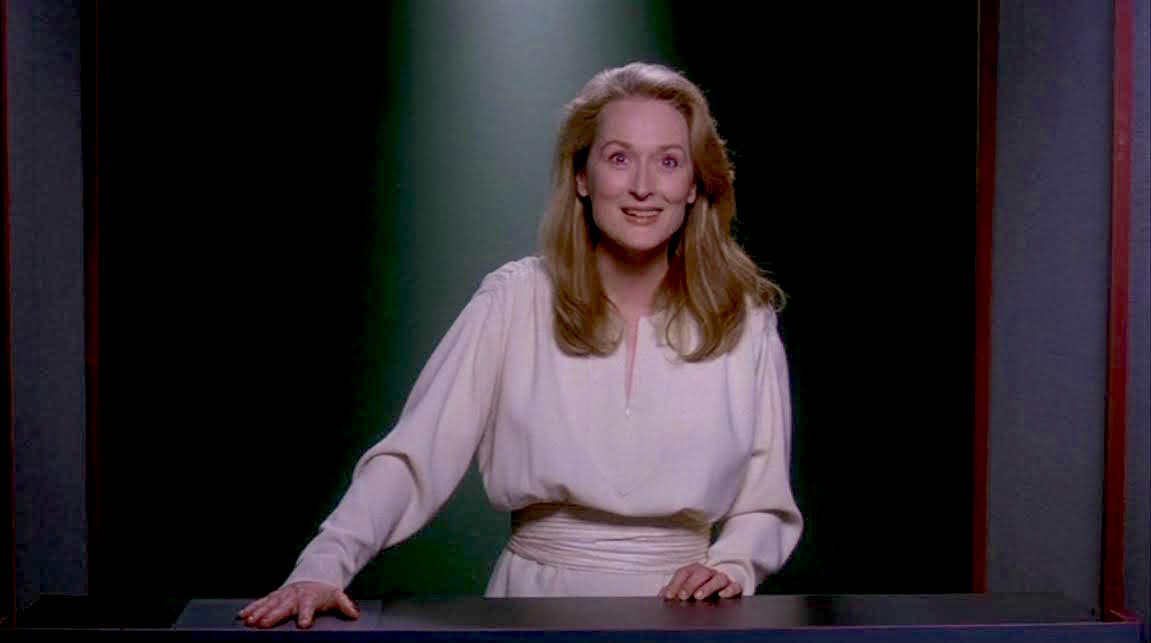
Casting Streep as a model human being is almost too on the nose. A highlight from her reel of “life choices” depicts Julia saving her two children from their burning home and even heading back inside to rescue their cat. I have never met Meryl Streep, but Defending Your Life suggests a completely plausible version of such an encounter, should it ever happen. Streep’s Julia, who has no trouble with the review of her life choices while Daniel is sent into a tailspin, exudes charm and intelligence, in marked and welcome contrast to Brooks’ self-deprecating deadpan. Streep is all smiles and giggles, laidback and awestruck at the simple pleasures afforded to Judgment City residents, like going for a casual nighttime walk or making use of the all-you-can-eat meals. “Isn’t it the best?” Julia remarks about the delicious, unlimited, and caloric-free food. Streep radiates pure joy, whether she’s munching on a corndog on a tram or slurping extra-long spaghetti with Daniel at an Italian restaurant.
Streep’s casting is perhaps Brooks’ most inspired directorial choice and he strategically keeps her out of the film just enough that while we are always awaiting her return, her character never overshadows Brooks’ central avatar. Do you read Julia as an obvious avatar for the actress herself? Were you charmed by Streep’s modest yet enjoyable performance?
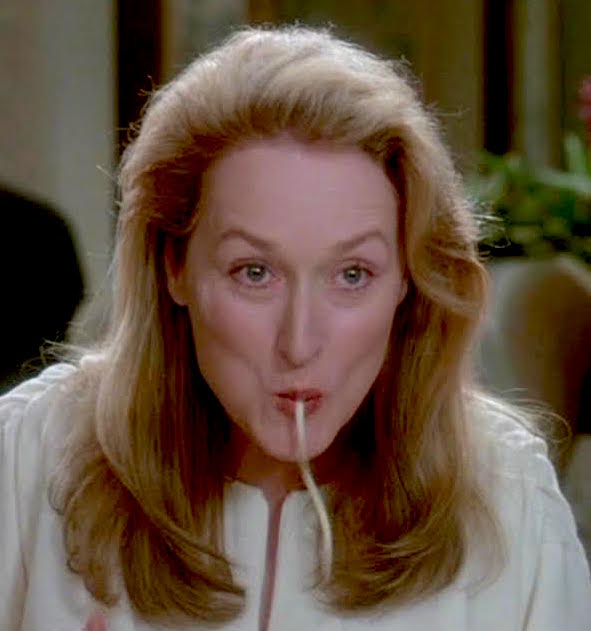 MATTHEW: I would say that Defending Your Life is the first — but certainly not the last — film to rely on the luminous and outwardly faultless fact of Meryl Streep. There is definitely an air of self-congratulation that permeates even the best of Brooks’ existentially comedic scenarios, like the delirious Baby Boomer breakdowns of Lost in America (still the cleverest and most inspired effort of Brooks’ uneven career as writer-director), and the worst, i.e. the stagnant, sitcommy quarrels with Debbie Reynolds in Mother. Brooks’ decision to have Daniel’s closest confidante appear in the disarmingly radiant form of Streep is indeed brilliant, not least because Streep is supremely capable of giving this shimmering chimera of a being some down-to-earth credibility and oodles of sincerity, which nicely counterbalance Brooks’ characteristic causticity.
MATTHEW: I would say that Defending Your Life is the first — but certainly not the last — film to rely on the luminous and outwardly faultless fact of Meryl Streep. There is definitely an air of self-congratulation that permeates even the best of Brooks’ existentially comedic scenarios, like the delirious Baby Boomer breakdowns of Lost in America (still the cleverest and most inspired effort of Brooks’ uneven career as writer-director), and the worst, i.e. the stagnant, sitcommy quarrels with Debbie Reynolds in Mother. Brooks’ decision to have Daniel’s closest confidante appear in the disarmingly radiant form of Streep is indeed brilliant, not least because Streep is supremely capable of giving this shimmering chimera of a being some down-to-earth credibility and oodles of sincerity, which nicely counterbalance Brooks’ characteristic causticity.
I believe very little of the backstory Brooks lays out for Julia, even the moments that are glimpsed first-hand (like the house fire) or described in detail. Streep, then, operates as a beguiling diversion for our skeptical minds; the role doesn’t really require any specificity from its interpreter so Streep doesn’t overdo or overthink her approach. Julia is a character made irresistible by Streep’s thrilling, frisky sense of play, like the way her eyes widen and glisten with wonder at the lavish surprises of Judgment City. Her wry, romantic rapport with Brooks is an immediate pleasure, especially because Streep’s conviction, like Holly Hunter’s in Broadcast News, brings out an unusual conviction and palpable sorrow from Brooks, an actor of occasional glibness. Through Streep’s relaxed naturalism, Julia gradually becomes the heart of the film, which is the product of Brooks’ sneakily sentimental script, but also of Streep’s canny casting. She makes Julia into a dream girl who is neither manic nor pixieish, and that’s all the film really demands of her.
The performance is a condensed and contentful joy but it’s also an altogether airy achievement, an idealized love object given some momentary womanly credence. I’m frankly baffled by those who rank Streep’s work here at the tippy-top of her greatest hits when there are so many finer-drawn characters of richer depth and more colorful dynamism lurking within just about every corner of this storied filmography. Am I missing something?
JOHN: Any list that ranks this lovely and adequate performance over Streep’s work in Silkwood, Postcards from the Edge, or Bridges of Madison County is, objectively, an invalid list. Devoted fans, my dear comrades, show their love for Streep the woman by trumpeting the role that comes closest to our (projected) understanding of who Streep the Woman actually is, but I can’t pretend that this is an especially revelatory or first-rate performance, especially considering the surrounding filmography. I can’t say I blame such fans; who wouldn’t want to spend more time with Streep’s Julia?
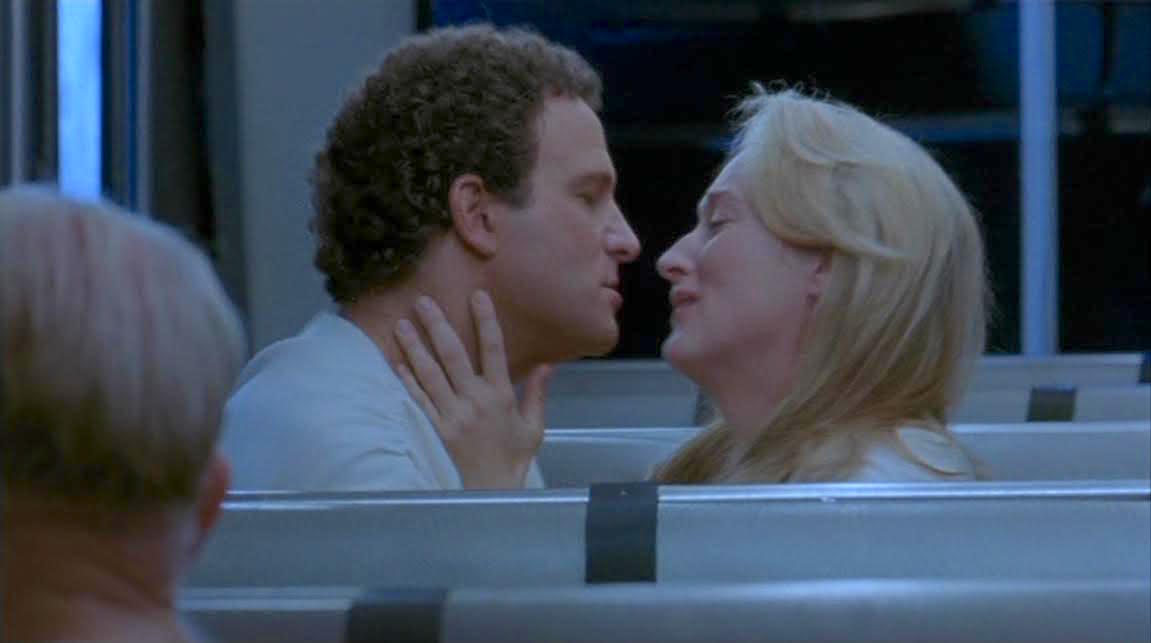
In the spirit of the film’s curious sense of reincarnation, let’s end our stay in Judgment City with a trip to the Past Lives Pavilion. Let’s say Streep, the actress, places her hand on the scanner, Shirley MacLaine appears (undoubtedly the funniest moment of the film), and we view the five actresses that have had the most significant effect on Streep’s work and career. I’ll start with the obvious: Bette Davis, a queen who consistently demanded more of audiences, studios, and herself, playing women fed up with limitations and determined to achieve her own desires. “Bette Davis,” as I’m sure you know Streep has once said, “seemed willing, she even had an appetite, for parts that were conventionally unappealing. She changed the requirement that actresses in the movies invariably be likable or attractive. She lifted the veil of appropriate behavior in women to expose what was scary, unexpected, or ugly—in other words, to do what was appropriate for the character.” Next would be Carole Lombard, one of Hollywood’s most luminous and intelligent actresses, with a presence and comic timing Streep sports even in films that are not outright comedies. Who are the last three actresses that have linked their DNA into Streep?
MATTHEW: As we discussed in last week’s write-up of Postcards, I see numerous traces of MacLaine’s hearty, varicolored characterizations in the latter half of Streep’s career, perhaps the lasting influence of their fruitful mother-daughter match-up. I also see a lot of the earthy, elemental virtuosity of Anna Magnani in Streep, and not just in The Bridges of Madison County. During a talk at the 2016 Rome Film Festival, Streep spoke about her first time watching Magnani, as well as Marlon Brando, in Sidney Lumet’s The Fugitive Kind. “I was pinned against the wall,” she describes. “It was a revelation... Something in [this] woman was so pure.” Streep may be one of our most famously trained actresses, but there’s a febrile instinctiveness to her vigilant presence that is sheer Magnani. And like so many American actresses, Streep is inextricably indebted to early screen goddess and Best Actress foremother Janet Gaynor, whose performances emanated from her entire body, not just those distinctively innocent eyes, and evoked a form of phosphorescent emotionalism that I see in so much of Streep’s output, especially her early triumphs. Each of Streep’s crowning achievements expands an art form that is very nearly unimaginable without Gaynor’s pioneering ingenuity.
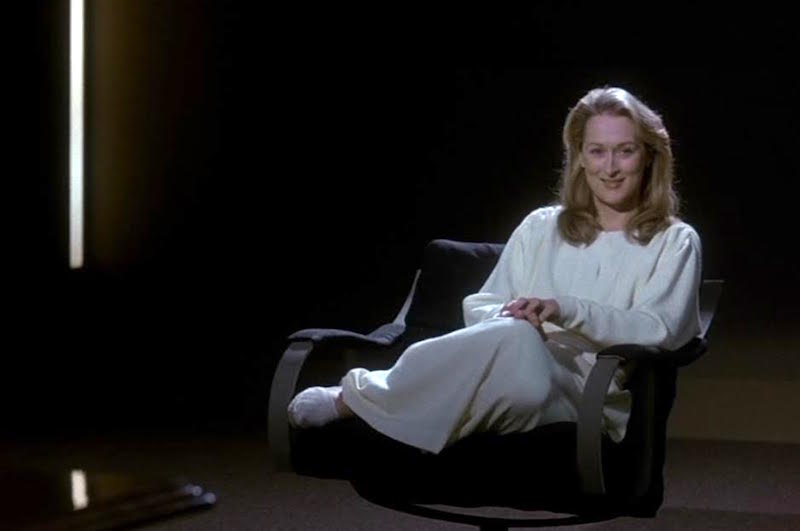
Catch up with 'Months of Meryl' why don't you?
- Julia (1977)
- The Deer Hunter (1978)
- Manhattan (1979)
- The Seduction of Joe Tynan (1979)
- Kramer vs Kramer (1979)
- The French Lieutenant's Woman (1981)
- Still of the Night (1982)
- Sophie's Choice (1982)
- Silkwood (1983)
- Falling in Love (1984)
- Plenty (1985)
- Out of Africa (1985)
- Heartburn (1986)
- Ironweed (1987)
- A Cry in the Dark (1988)
- She-Devil (1989)
- Postcards from the Edge (1990)



Reader Comments (11)
I enjoy this movie every time I see it. I think Brooks pitched it to Streep when she was living in Los Angeles. Playing “the girl” was very appealing to her at this juncture of her career. I also recall Brooks saying that many ill people have told him over the years how much the film helped prepare them to (possibly) meet their maker. It’s light and funny, sweet, romantic, with great supporting turns by Lee Grant and Rip Torn.
My favorite scenes are the Lee Grant ones. Brooks' screenplay, per usual, is terrific too and would've been deserving of an Oscar nom.
My sister and I loved this movie growing up and watched it numerous times on HBO in the 90s. I recently caught it again on Netflix (I believe) and still love how it flows so well and is so easy to watch.
Brooks' view of humanity is cynical, albeit funny. Meryl brings some much-needed warmth to the entire endeavor. We wouldn't care much about what happens to Brooks' character without her involvement. Because he cares what happens to him, so do we.
It's been years since I've seen this film as I do like Meryl in this film. The Academy I think have a love-hate relationship towards Albert Brooks which leans more on the hate side towards him which is probably why he's never been nominated for an Oscar.
thevoid99: I assume you were referring to his writer-director career? He has been nominated for Oscar (Best Supporting Actor for BROADCAST NEWS).
thevoid, he was nommed for Broadcast News.
Recently on TCM, I caught a Greer Garson movie called 'Julia Misbehaves'. From her introduction in a bathtub, through the whole movie, it was like watching a Meryl Streep performance. The physical resemblance was haunting.
I really enjoyed this film, back in the day, and now. Streep and Brooks are a perfect odd couple.
Lee Grant and Rip Torn provide some great comic moments. I loved the video highlights of Julia's life and the fact that her supervisors kept replaying some of them because they loved them so much. That's exactly how we all feel about Streep.
She did Postcards and Defending your life back to back and still some criticized her ability to do comedy. Ridiculous.
This is actually my favorite Meryl Streep performance. I think it is mainly because it is an enjoyable (not enjoyable-superficial) watch: every beat is perfection, every cadence is measured, and the comic delights are unforced. Maybe Meryl the person is closer to Julia and that is maybe key to this effortless delineation. More importantly I like actresses that make me believe they do not "act" but incorporate verisimilitude in their characterisation without drawing attention to it. I rank this higher than any Oscar-nominated Meryl performances not because this is light or disposable (far from it) but how she codifies Julia's almost saintly life on Earth as a natural extension in the afterlife. I much prefer this to Doubt, August: Osage County, The House of the Spirits and Into the Woods anytime.
Thanks for the wonderful write-up and analysis!
Haven't seen this one. I see Mathew responded to Pauline Kael re:Streep in this post ("she only acts from the neck up") :)